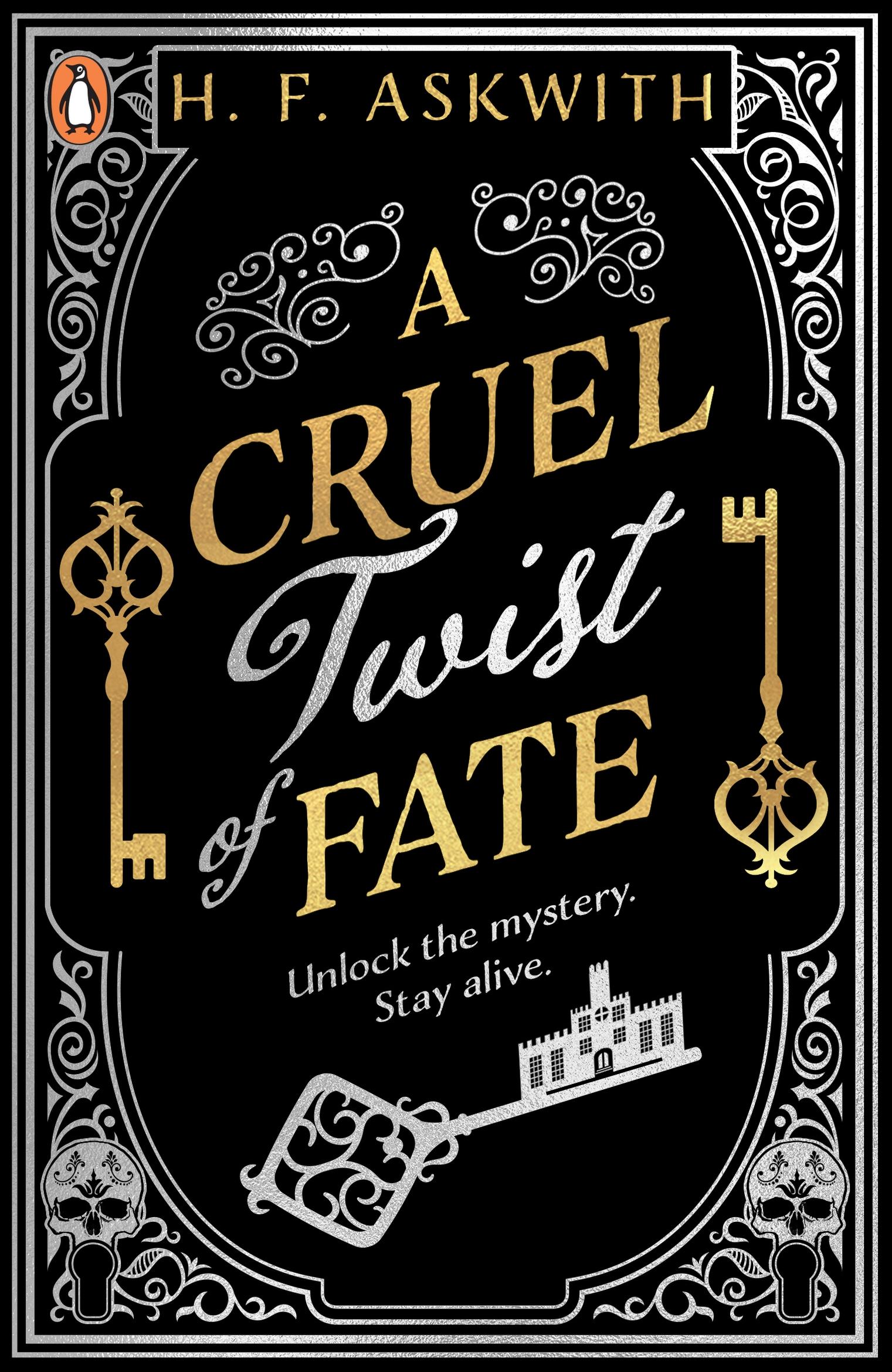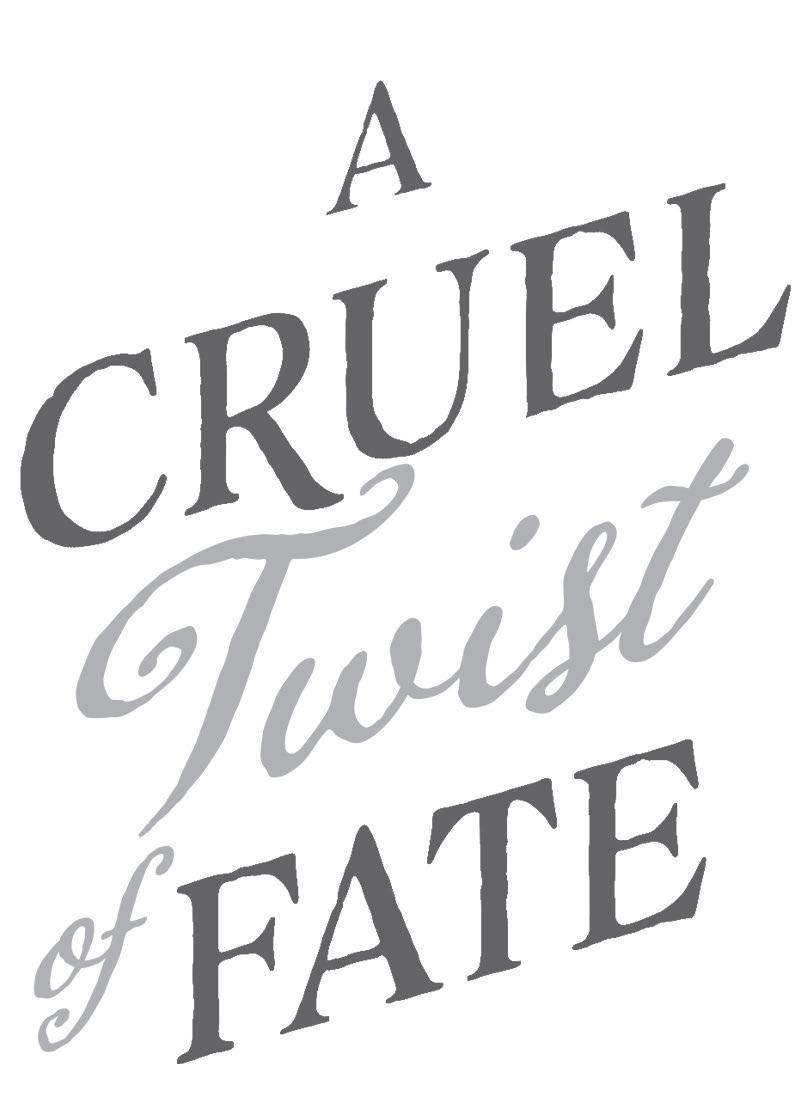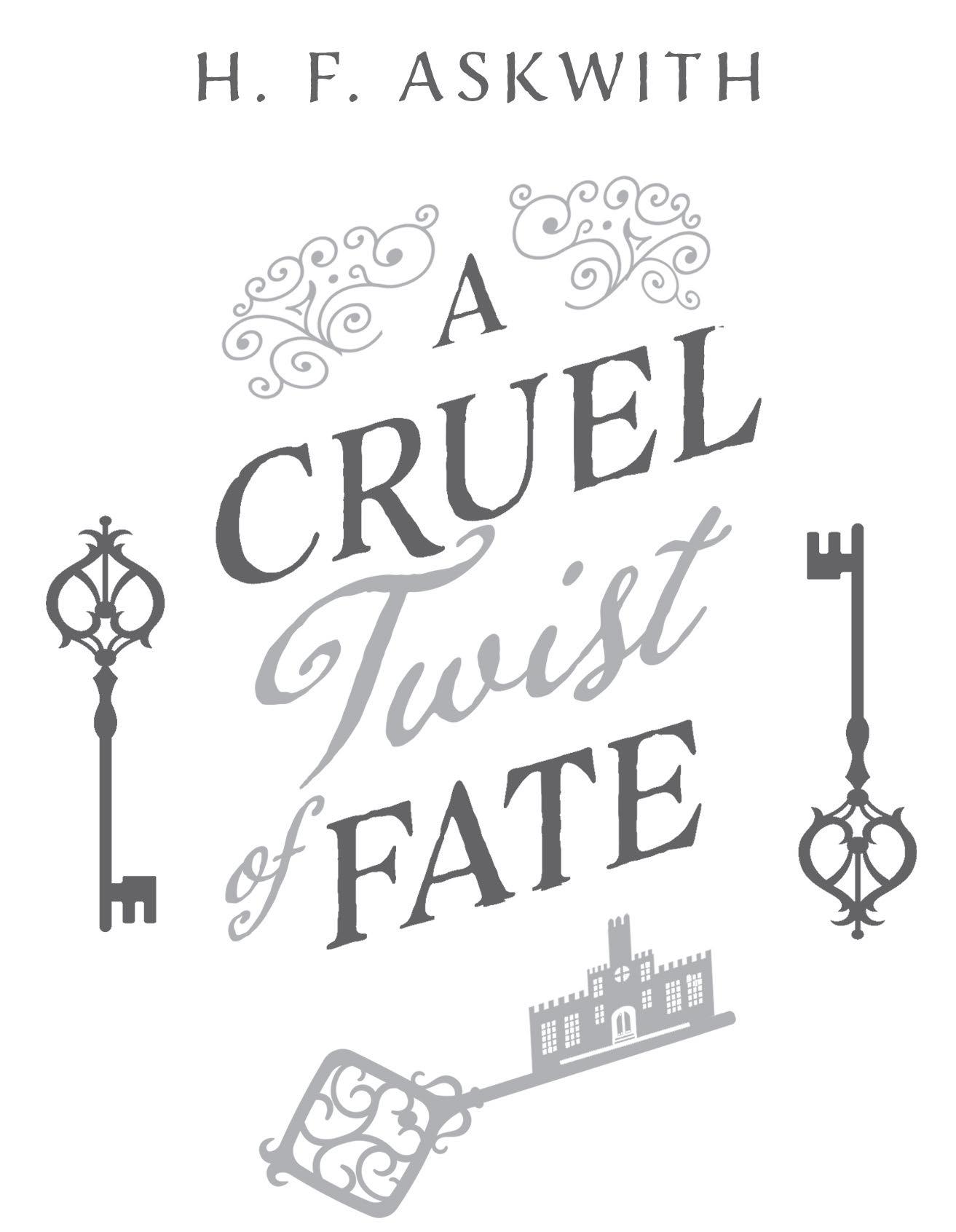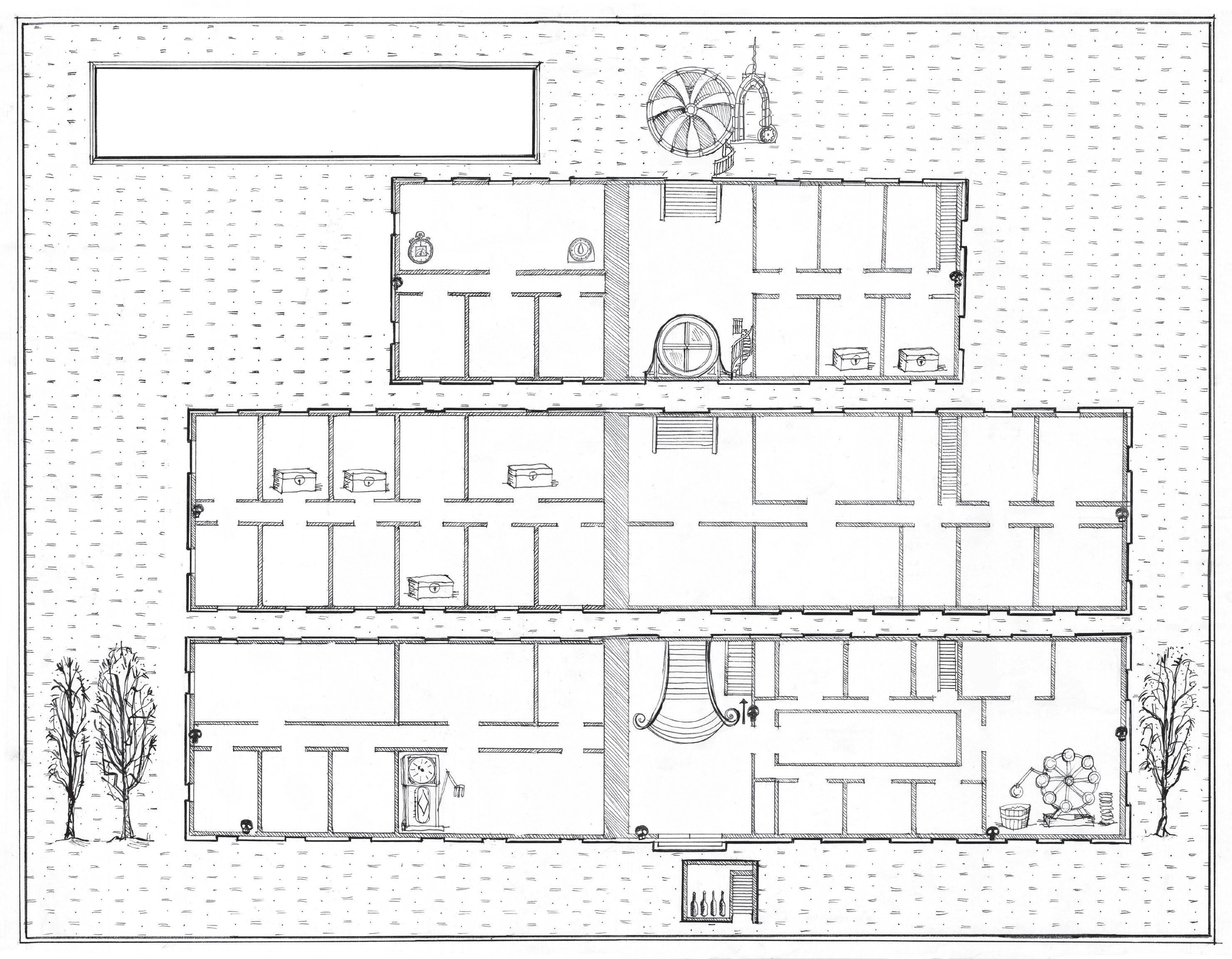
PENGUIN BOOKS

Other titles by H. F. Askwith
A Dark Inheritance

PENGUIN BOOKS
UK | USA | Canada | Ireland | Australia
India | New Zealand | South Africa
Penguin Books is part of the Penguin Random House group of companies whose addresses can be found at global.penguinrandomhouse.com.
www.penguin.co.uk
www.puffin.co.uk
www.ladybird.co.uk
First published 2024
001
Text copyright © H. F. Askwith, 2024 Map illustration copyright © Emily Faccini, 2024
The moral right of the author and illustrator has been asserted
Set in 10.5/15.5pt Sabon LT Std
Typeset by Jouve (UK), Milton Keynes
Printed and bound in Great Britain by Clays Ltd, Elcograf S.p.A.
The authorized representative in the EEA is Penguin Random House Ireland, Morrison Chambers, 32 Nassau Street, Dublin D02 YH68
A CIP catalogue record for this book is available from the British Library
isbn : 978–0–241–62964–2
All correspondence to:
Penguin Books
Penguin Random House Children’s
One Embassy Gardens, 8 Viaduct Gardens, London SW11 7BW
Penguin Random Hous e is committed to a sustainable future for our business, our readers and our planet. is book is made from Forest Stewardship Council® certified paper.
For Jake

Tower

Molly Night Nursery Day Nursery
Hallway
Staff Stairs
Schoolroom Birdie Nora
Landing
Morning Room
Workshop Guest Room
Portrait Gallery
Guest Room Head of Maintenance Housekeeper Guest Room
Entrance Hall To Cellar
Main Servants’ Chambers
Staff Entrance Toilet Toilet
Pantry Kitchen
Main Servants’ Hall Maids’ Chambers

February 1846
TERROR AT ARCHFALL MANOR !

Sighfeyre Isle, the tidal island that is home to the enigmatic and extravagantly wealthy Cauldwell family, has been cut off from the mainland for four days. Now that the storm has abated, it has been revealed that unspeakable horrors have unfolded within the Cauldwell ancestral home of Archfall Manor during this period of isolation. A number of bodies have reportedly been recovered, and foul play is suspected.
It is not the first time that the Cauldwell family name has been drenched in mystery – Mr Thomas Cauldwell’s daughter, Mrs Caroline Temple, has been thrice widowed, and eighteen years ago the elder Cauldwell son, Edwin, disappeared. Although his body was never found, the family reported him dead. These incidents continue to cast a long shadow . . .


The day the debt collector came, I was making cinder toffee. The sky was solemn and fateful, shrouding another grim January morning. A grey and miserable daylight strained through the window as I stirred the sugar and the syrup into water in a heavy-bottomed pan. They combined, melting into a gooey, oozing and dangerously hot sludge. I stopped stirring and put my spoon on the worktop before reaching for the jar that contained the white powder, which created an effect that was almost magical when I sprinkled it in. I grabbed a little tool I’d fashioned myself from wire, designed to whip air into my mixtures, and I whisked quickly, beating the mixture as it bubbled, frothing and foaming and taking on a lighter hue, the sandy colour of the coastline in summer. It was transformed.
I always thought there was something about making sweets that was like being a conjuror – take these humble ingredients, combine and transform them, create a treat that provokes the sensation of delight. What is that if not magic?
Before I lifted the pan, I blew away a loose strand that had escaped my plait. My hair, copper-coloured and as thick
and strong as wire, required wrestling into submission every morning, and even when it had been fastened it managed to irritate me no end. This was the part where I needed to be careful – my grip was tight, but the pan was heavy, and it would only take one second, one nudge, one slip. Most people don’t realize the dangers of working with sugar: not only does it burn, it sticks. You try to wipe away the sugar and you take your skin with it, leaving you raw, revealing the layer beneath . . . I was still waiting for my blistered finger to heal after the previous week’s splatter of lemon caramel.
The constant threat of scalding kept me focused, despite the rowdy noise from the busy street outside. Our tiny, ramshackle sweetshop was just a short walk down from the towering Durham Cathedral but being in such a prime location came with a hefty rent and, crammed in among all the other businesses jostling for space, I knew we were barely breaking even.
I began to decant the toffee mixture into trays. It was during this precarious operation, with the surge of sugar requiring all my concentration, that the bell to announce a customer chimed. The toffee was a swollen, puffy thing as it spread across the tray with a life of its own. It breathed in, creating pockets of air in its skin as it cascaded from the pan.
‘One moment!’ I called, shepherding the liquid with care, scraping the rest of the contents into the tin. Our customers often liked to browse, anyhow.
But this was no ordinary customer. He lifted the wooden hatch of the counter and slipped through, strolled into the kitchen as if he were in charge.
‘You can’t come back here,’ I snapped. ‘I’ll be out to serve you when I’m finished.’
‘I’m not here to rot my teeth,’ he said, and his voice was as silky smooth as the centre of a violet cream. His tone, though, was as sharp as a sherbet lemon.
He had shoulder-length hair the colour of coal and a dusting of dark stubble over high and well-defined cheekbones. I couldn’t help but envy him his thick tweed coat with its cape over the shoulders – the winter had been biting and showed little sign of relenting any time soon. Despite the warmth of his clothing, his eyes had shards of ice in them. The palest of blues.
He was blocking my way out, and my whole body tensed. A taut muscle in my neck started to twitch. I no longer felt merely irritated by the interruption, but deeply unsettled.
‘If you’re not here for confectionery, then you’ve walked into the wrong shop,’ I said through gritted teeth, trying to sound braver than I felt.
‘Oh, I’m not mistaken,’ he said. A smile slid across his lips, which were thin and almost disappeared as they stretched. It was not a kind smile, and my skin started to prickle. He laughed, and it was a robust sound, the laugh of a man who settled down in a comfortable bed and slept every night with a full belly.
‘What do you want then?’ I snapped, placing my hands on my hips even though inside I was shrinking, like one of those birds who puff up their feathers as a defence. My nerves were frayed. ‘I’m not interested in riddles. Can’t
you see I have enough to do?’ I gestured wildly at the kitchen – it was full of the clutter of a morning spent crafting sweets.
‘No riddles,’ he said. ‘I’m here to collect your debt. It’s court-ordered now. Your landlord has had enough of waiting.’
My stomach sank. I knew that some months we had struggled when business was poor, but I didn’t know Mam was in debt. My gut plummeted further when I thought of the money I’d been stealing from our shop’s takings in return for late-night lessons in reading, writing and arithmetic from Josephine, a tutor at the boarding school. I was investing in my future, I’d told myself. But at what cost?
‘So?’ the debt collector asked. ‘Do you have the money?’
‘How much is it?’
I steeled myself to hear the answer, but no amount of preparation could have made the blow easier to receive. The sum was staggering, and, given the meagre profit we made at the shop, clearing it by selling sweets alone would be impossible.
‘I don’t . . . I . . .’ The words stuck in my throat.
‘I didn’t think so. In that case, what do you have for me?’ He appraised the row of pans, picked one up and weighed it in his hand as if to determine its worth like a piglet at market.
‘You take that and we won’t be able to pay the rent, let alone put anything towards the debt. How am I meant to make sweets without utensils?’
The man bared his teeth. ‘I don’t think you understand. You won’t be making sweets here for much longer. This is
the end of the road.’ He pulled out a document from his pocket and slammed it on the worktop. ‘One month to pay up. One month before your ma is hauled off to the debtors’ prison, and the bailiffs take every last thing. I’m merely here to collect enough to keep you in business until then.’
I stared at the hand holding the paper. The fingers were bonded together by what looked at first glance like an elegant piece of jewellery, but bile rose in the back of my throat as I realized that the polished silver bar wasn’t there for decorative purposes. The raised ridges were designed to turn his fist into a weapon.
‘I’ll check the cash drawer,’ I said, defeated, trying not to think how we’d pay for food. ‘Let me past.’
He moved, and I shuffled out from behind the worktop. I had a vision of clobbering him round the head with the cast-iron frying pan hanging on the wall, skewering him with the poker that stoked the fire, tipping the cinder toffee mixture all over him . . . But the pictures were momentary. Any bravery I’d felt had melted away for good.
I opened the drawer and surveyed the modest takings, minus what I’d already pocketed to give to Josephine for that evening’s tutoring session. The regret was a damp lump inside me, like a failed pudding.
I counted out the coins and placed them on the counter. ‘Take it then,’ I said.
It was worse than if I’d been robbed in the street. I felt cowardly. But what else could I do? I was no match for him, unkempt in my apron stained by remnants of candies and pies of the past.
‘Barely touches it,’ he said, sneering at the offering. He snatched the coins up, anyhow, and raised his fingers to his brow in a mock salute. His pockets jingled as he opened the door to leave. A gust of freezing air pushed its way past him to raise gooseflesh on my arms. Then he turned and said nastily, ‘I must say, I have been confused about this whole affair. Given her connection with them, why doesn’t your mother just see if her wealthy friends the Cauldwells will pay up for her?’
I frowned, an uneasy feeling creeping down my back.
Sensing that his words had produced the desired effect on me, and smirking once more, the man finally decided to stop tormenting me. With a last nod, he turned and disappeared down the street, leaving me with the empty cash drawer and an embarrassment as hot as boiling sugar. My cheeks flushed, despite the chill. What he had said about the Cauldwells unsettled me deeply. That family were no friends of Mam. They were talked about all over town, but she always shuddered at the very mention of them . . . Which, of course, made them fascinating to me.
The Cauldwell family were enigmatic, immensely wealthy and incredibly reclusive – they lived on a private tidal island called Sighfeyre Isle just off the coast. The patriarch of the family, Mr Thomas Cauldwell, was a famed inventor, like his father before him, but he was known for his reluctance to leave the island.
And somehow they’d been connected to my father. The last time Mam saw him, he was heading to Sighfeyre Isle – then he was never heard of again. That was as much as she
had ever been willing to tell me, which naturally only fuelled my fascination with them further.
The lifelong dearth of information about my father had always left me feeling incomplete, in a way I knew Mam could never understand. Her upbringing was very simple and loving, although her parents had passed away within a year of each other, several years before I was born. I knew that grief plagued her daily – I was all she had left.
‘The less you know about your father, the better,’ she’d tell me. ‘It’s my job to keep you safe.’
That antagonized me more. That the Cauldwells were somehow linked to my father meant they had already determined so much of our fate – from the incomplete feeling never knowing him gave me to our current desperate financial situation.
I stewed on the debt collector’s words for the rest of the morning until Mam returned from running errands, cursing the cost of ingredients. I was scrubbing the pans, an ache in my elbow and a tight crick in my neck. I’d been holding my shoulders up about my ears, and it took a concentrated effort to relax them, to roll them out like dough. There was still a lot of work to be done, so I buttoned my lip, thinking about when would be the right moment to ask Mam about what the man had said. I’d have to be careful – one wrong move and she’d shut me out, I knew it.
When our work for the day was done, I discarded my apron. Mam prepared a plate of crusty bread and heated a little pot of dripping, and, when she was done, I extinguished the candles and plunged the kitchen into darkness, leaving
just one tiny stub, cupped in my hands, as a little paring knife of illumination. The stairs sighed beneath us as we ascended into the family rooms. The upper floor had creaky wooden floorboards and exhausted ceiling beams. There had always been a perception in the town that in order to run a shop you must have money. If only that were the truth. There was no pile of gold hidden away under our floorboards, only dust.
Mam’s face was stern as we sat to share our meagre supper. ‘You have that look about you. You’re plotting.’
‘I am not plotting,’ I said, but of course I was.
I was desperately considering our options. Even before the visit from the debt collector, I had always tried to be one step ahead, somewhere in the future, chasing to keep up with my dreams. That was why I’d begun my lessons – I wanted to do something more. Although I’d never quite had the luxury of time to figure out what that something might be, I knew I’d need some sort of education to give myself a chance.
I looked at the sorry state of the room around us and wanted to cry. We worked so hard, but it still wasn’t enough. Now Mam would have to do hard labour in the prison to pay off the debt, long and back-breaking hours that would make our days in the shop seem like a holiday. Families could live there too, allowed to pass in and out, so I would have a choice to make – try and fend for myself, homeless and with no prospects, or join Mam in prison.
Mam pressed again. She knew something was wrong, her eyes narrowing. ‘What’s happened?’ she asked.
‘A debt collector came to the shop today,’ I said flatly.
Mam put her head in her hands. ‘Oh, Helena. I’m sorry,’ she said. ‘I thought I could get on top of it . . . find a way to pay. But it’s out of control.’
My heart sank. A tiny part of me had hoped it might all have been some terrible mistake. ‘Mam, if we can’t pay . . .’
She shook her head. ‘I don’t see how we can. It’s just too much. I’m so sorry, Helena.’
‘Don’t be sorry,’ I said, struggling with the guilt and my regret. ‘I . . . I’ve been taking money from the cash drawer.’
‘I know,’ Mam said softly, simply.
Shame rushed to my face. ‘You do?’
‘You’ve been getting lessons from that girl at the school.’
Mam arched an eyebrow. ‘Do you think I’m completely oblivious to what goes on around here? You can’t deceive me. I’m the one that raised you – by myself, I might add – and I didn’t do that by being a fool.’
‘Well, you did a good job of convincing me that I’d managed to keep it a secret,’ I said with a tiny smile. I always thought I was skilled at reasoning, prided myself on my investigative ability. Seemed as though I’d inherited that from my mother.
‘You know I only want good things for you, Helena,’ Mam said. ‘We would have ended up here whether you took that money for your lessons or not.’
A silence settled between us. There was something else I needed to ask her, and yet it felt explosive to do so. But I couldn’t wait any longer.
‘The debt collector said something odd when he left. He said you should ask your friends the Cauldwells for help.’
She froze as if I’d poured ice-cold water over her head.
‘What did he mean?’
‘Nothing,’ she said. Too quickly, too firmly.
‘But why would he –’
‘I don’t know, Helena. But I forbid you from speaking about them again. That family are dangerous. They – they’re the reason your father is dead.’
I was stunned. I’d heard Mam’s opaque warnings about the Cauldwell family so many times over the years, and she’d hinted that she thought they were behind my father’s disappearance. But this was the first time she’d accused them of being implicated in his death.
I never met my father. He died when I was just a baby. It pained Mam deeply to talk about him, so when I was younger she’d only offered up tiny jewels of information now and then, and as I grew older I knew better than to ask about him. So the facts I’d gleaned about my father were limited: Mam had called him Ned; his eyes were the exact same shade of brown as mine; he’d had an extensive repertoire of hilarious anecdotes about a cat he’d had as a child; his favourite sweet was a violet cream; he was a watchmaker by trade.
Once, after I’d been pestering her for more information on him, Mam asked me, from what seemed like a place of hope, ‘Surely you can’t miss what you’ve never had?’
And I’d said, ‘Yes. Yes, you can.’ The fact he wasn’t there changed every part of who I became.
Mam had never told me the specifics about how my father died. I’d always assumed that something had happened to him on his journey to Sighfeyre Isle – crossing the causeway that kept it isolated from the mainland was known to be perilous at times, so it seemed a fair guess. And I didn’t heed Mam’s warnings to leave the matter alone. Instead, I’d become utterly obsessed.
Over the years, I took the task as seriously as if I were a detective at Scotland Yard, devouring gossip and hearsay alongside weighty pamphlets about the Cauldwells’ inventions. A few years before, I’d found a pamphlet stashed away among some old paperwork in the shop. It was written by Edwin Cauldwell, the elder son of the family. It was a complex treatise on a theory of time, full of theoretical arguments and odd diagrams, including a strange scratchy illustration of an archway. I’d shown it to Mam, asking whether it had belonged to my father, and she’d taken it away from me.
What little I learned continued to fascinate me. The Cauldwell family had historically been known for all manner of pioneering research and spectacular innovations, and had funded many more through the Cauldwell Institute of Invention, which had been led by the family for generations. Thomas Cauldwell, the current patriarch, was retaining leadership into his old age.
A widower in his seventies, Thomas had had three adult children. The elder son, Edwin, had died eighteen years before, and his younger son, Wilbur, was reputed to be as reclusive as his father. There was also a daughter – Caroline
Temple (née Cauldwell, latterly Richardson, latterly Burton) – who was best known for surviving three husbands. While the first had died tragically of tuberculosis, the other two, if the gossip in the papers were to be believed, had died in ‘suspicious circumstances’.
Not that any of that was much help to me now. I tried to ask my mother for more information about what she’d meant by accusing the Cauldwells so directly, but, as I’d suspected she would, she refused to say any more. I knew better than to press her once she’d gone silent – but I couldn’t sleep that night for thinking about what she might have meant.
The day after the debt collector came, I obtained a secondhand daily paper our neighbour, an ill-tempered milliner, had finished with. I pored over those pages until the tiny print began to swim, desperately seeking any kind of advertised opportunity that might help us to make some more money.
So, when my eyes alighted on the vacancy, it hit me with such force that I almost lost my balance and toppled off my chair: the Cauldwell family were seeking a governess to join their staff.
Caroline Temple was returning to her ancestral home, Archfall Manor, and was in need of a governess willing to reside on the tidal island to educate her daughter. I already knew that her third husband – the one whose name she bore – had died under unfortunate circumstances, but this time she was fleeing London after two decades. Suspicious,
I thought. The pay was very good – not sufficient to prevent the repossessions and Mam’s incarceration, but enough that, after a couple of years’ work, I might be able to turn our fortunes around.
It felt as though fate had reached out and tapped me on the shoulder. Not only was this a chance to save Mam, but I might – just might – be able to find out more about what happened to my father.
What other choice did I have than to apply?
That night, after Mam had surrendered to another exhausted slumber, I crept back downstairs and penned an impassioned letter of application by candlelight. I wrote about how I believed that the daughter of a family with such an incredible history of invention and innovation deserved a tailored and practical education, and how I intended to deliver this through a scheme of learning that followed the child’s line of enquiry to retain engagement and focus. I based it on my own notions of education, on the way that I studied with Josephine. We alternated between gulping down scientific treatises and indulging in reading practice (my favourite novel was a modern romance about first impressions gone wrong – though I chose not to mention this fact).
That the ideas in my letter were rather outlandish for consideration by the societal elite did cross my mind as I arranged for its delivery. And yet, given what I had learned about the Cauldwell family, I reasoned they might be just the thing to make me stand out. I worked harder on that letter than I’d worked on anything in my life, knowing that
it might be my only opportunity to gain access to the house, to gain access to the family, to gain access to the truth.
There was a necessary deception involved. My name didn’t come with a glowing teaching reference – not like the one I knew Josephine had. So, with only a modicum of guilt, I took hers and signed my letter Josephine Martin.
Days passed, then weeks. We drew ever closer to the courtordered deadline, and we were nowhere near repaying the debt. Mam seemed to grow thinner before my eyes as our belongings disappeared from around us. The debtors’ prison loomed. And then . . . a letter.
Thick, textured parchment. Upon the front, the shop address elegantly inked. Fastening the back, a ruby-red wax seal, imprinted with a crest featuring a curling letter C. My fingers trembled. A response from Sighfeyre Isle – I hadn’t dared to imagine it, and yet here it was in my hands. I tore it open immediately, thankful that Mam was out. I could barely read the letter enclosed, the excitement making my vision wobble and the words jump around on the page.
Mrs Caroline Temple was inviting me – me! – to a trial period at Archfall Manor where I would act as governess to her daughter, with a permanent role pending her approval. The thrill that rushed through me was dizzying, disorienting and spiked with anxiety. It was everything I could have hoped for, and now . . . it was real.
When I told Mam, I lied several times. I lied about the household, saying that I’d be working for a family in
Edinburgh, and I lied about how I’d got round my lack of experience, saying that Josephine had vouched for me and written a reference. There was something inscrutable in Mam’s expression, and I was caught off guard by the strength of my own feelings. I was not ready to begin the painful process of detaching myself from her, from the one person who loved me – and through a lie I knew she’d be devastated by. The deceit twisted uncomfortably inside me.
But it needed to be done. For the money . . . And, more than that, for the thing she had sworn to keep from me. The truth.
I wrapped my arms round her so that she wouldn’t see the tears brimming in my eyes.
‘What an opportunity!’ Mam’s voice was full of pride. ‘A governess. Imagine that!’ She seemed struck through with grief, or relief, or some concoction of the two.
‘I’m delighted,’ I said.
It was a half-truth. There truly was a part of me that harboured excitement for what was about to unfold . . . But a dark trepidation also left me fearful because the warning still stood. For all my fascination with the Cauldwells, Mam believed them to be dangerous – and so far I had no evidence to the contrary.
‘Always knew you were a bright one –’ Mam planted a kiss on the top of my head – ‘from the moment I held you. You looked right at me, as if we’d met before in another life. So sharp.’
I’d heard Mam tell this story many a time, polished over the years so that it became as smooth as a mint imperial
rolling over her tongue. There were many anecdotes like this, where I said something interesting as a child, where I became proficient in a skill before my time, where I gave some indication that the brain ticking inside my skull had potential . . . The message was clear: I was clever. Special. Destined for something. Isn’t it funny how the things that people tell you about who you are become the things you rest your identity in? Because if I was not everything that Mam believed me to be . . . then who was I?
I just didn’t know. And I simply refused to accept that not knowing was my fate.
Mrs Caroline Temple had invited me to join them on the tenth of February – two weeks away – and so I made a tutoring appointment with Josephine as usual, but this time with corrupt intentions. Throughout the session, I waited for an opportune moment of distraction, which arrived when Josephine was interrupted by one of her charges and had to attend the dormitory where the boarders slept.
Uncertain how long I’d have, I swiftly began rummaging through her drawers, searching for the reference papers I knew I might be asked for when I arrived at Archfall Manor. They were neatly tucked away with a small purse filled with coins, and although there was the temptation to pocket these too while I was already committing a theft, I knew that any additional layering of guilt would be more than I could bear. I slipped the reference papers into my dress, and returned everything else as it had been.
About a week before I was due at Archfall Manor, the bailiffs descended on us. That morning, as I dragged myself off our ancient, sagging mattress, there was a horrible clatter that shook my very bones. I stumbled clumsily towards the stairs and listened to the cacophony of chaos. It was the sound of the upheaval of everything we owned.
I spotted three bailiffs traipsing in and out of the shop, brawny arms full of our belongings: saucepans, skillets, trays. These were the tools that Mam and I used every day to make the sweets. Some of these items of culinary equipment had been in our family for generations. They represented hours of work, years of dedication to the craft, decades of hope that this business would provide a good living for us and a legacy for the ones who came next.
And now anything that wasn’t nailed down was being carted off.
I ran down to the kitchen where Mam had crumpled to her knees, her body wrapped round a small frying pan that we used when making pancakes on Shrove Tuesday. She looked up at me and saw that we were, momentarily, alone.
‘They’ve sent for the constable,’ Mam said. ‘You know what that means.’
And I did know. If I didn’t get out of there with haste, I’d likely be dragged away to the debtors’ prison with her. I had to leave.
The bailiffs returned empty-handed and ready to grab more. I dashed up the stairs and crammed my paltry belongings into my satchel. My property did not amount
to much – a shawl; my best dress, second-hand from the market but in excellent condition; my next-best, torn at the sleeve; my undergarments; the two books I owned, both gifts from Josephine on my eighteenth birthday, a Dickens and an Austen . . . and Josephine’s stolen reference papers. I slung the satchel over my shoulder. Anxiety rose through my chest and lodged in the notch in my throat, making it hard to swallow.
I waited at the top of the stairs for the opportune moment to escape without my bag being searched for valuables. Mam was standing by the back door, had opened it for me in preparation. She gestured for me to come down, and wrapped me tightly in her arms. I could hear the thud of her heart, didn’t want the embrace to end.
‘Keep yourself safe,’ she said. ‘And write to me if you can. I don’t know if I’ll get letters in prison . . . but write them anyway.’ I hated to think where she was going, how we would be apart.
‘Of course I will. I love you.’
‘I love you too.’ She let go of me and forced a smile, but I could see the tears forming in her eyes. ‘You’re my brave girl. I’ll miss you so much.’
The doubt had begun to creep in, to squeeze at my heart. I wasn’t ready. I should have had another week to prepare, to say a real goodbye. We’d never spent a night apart in all our lives. I dreaded the thought of where she’d be by the time darkness fell.
‘I’ll work hard,’ I said. ‘And one day we’ll be together again.’
A growling internal cruelty had started to rear its head. You’re not good enough. They’ll see right through you and dismiss you immediately. You will never be worth anything. I ushered the beast back into its cave with promises that it could berate me later, that it could keep me awake all night if it wished. But now I had to leave.
I hovered for a moment.
‘Go.’
I told Mam I loved her again, my throat closing up and my eyes beginning to fill so that my vision started to swim. A clatter at the door signalled the return of the bailiffs, and so I slipped out into the alleyway. The back door slammed shut behind me.
I looked up at the shop, not knowing if I would ever set foot in it again, and a deep crack opened inside me. But I didn’t have time to feel the tremors reverberating. I had to make myself scarce and there was only one place I could go.
With tears streaking my cheeks, I careered down the winding paths like a carriage with one wheel torn off. The harsh wind whipped me across the face as I ran. The cobbled streets of Durham were unforgiving, my feet in their thin shoes getting pummelled with every step as I hastened past the cluster of shops, weaving and dodging through crowds. I went as fast as I could, as though it might be possible to outrun the thoughts telling me I was worthless in this world, that it didn’t matter how hard I tried, how hard I worked, I’d never be more than the girl from the sweetshop.
Sprinting past the River Wear, I hushed the echoing criticism in my mind and tried to focus on the task at hand.
I might never have been a governess before, but I was smart, I learned fast, and I wasn’t afraid to take risks. I gritted my teeth. This post could just be the beginning for me.
It was only as I reached the corner before Harry’s place that I smoothed down my skirts and slicked away the tears from my face. Even to my oldest friend, I would not show my devastation.
